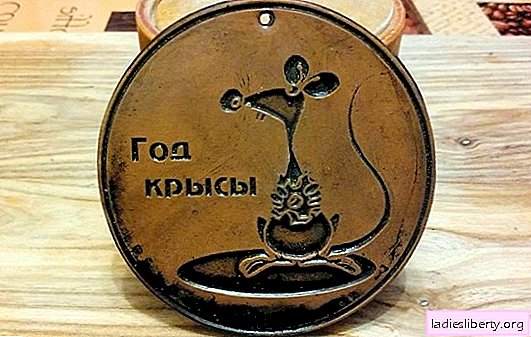
In the Caucasus they say that even if there is not a crumb in the house, then there is always lobio. Therefore, there are as many recipes for its preparation as there are soup and borsch in Slavic cuisine: each family has its own secret.
Bean dishes are popular in many cuisines of the world, but Caucasian lobio is easily recognizable by its unique aroma from a special set of spicy herbs and spices. There is one more secret of Caucasian cuisine - nuts.
It turns out that by the type of nuts you can determine the belonging of a dish of beans to a particular Caucasian cuisine. Indeed, stewed, boiled and fried beans with meat, mushrooms and vegetables often decorate tables throughout the Caucasus, and in each national cuisine it is cooked in its own way.
Lobio with nuts - features of the technology of the dish
We begin to discover the secrets of cooking lobio. In order not to overdo the intrigue, we start with nuts. In the Caucasian cuisine, nuts are an ingredient not only for baking and desserts. They are used for cooking main dishes and sauces. In Georgia, walnuts are preferred, in Armenia - walnuts and sesame are used more often for first and second courses, sauces, and almonds - for baking. Azerbaijani cuisine complements this list with hazelnuts.
The Caucasus is a generous land, and the peoples living there have learned for thousands of years to use the gifts of nature: in cooking, everything that rivers, forests, the sea and mountains give is used. This is done so harmoniously that it attracts the interest of gourmets throughout the post-Soviet space. For example, when going to nature, to fry kebabs or kebab, now few people think that the homeland of these dishes is the Caucasus.
So it was with bean dishes. Beans entrenched in European and Slavic cuisine only in the last century, and they are used mainly as an addition to soups and salads. Residents of the European part of the CIS are used to buying lobio in banks. The industry has mastered a couple of technologies for its production: natural beans and in tomato sauce. Well, maybe a few more types of canned asparagus beans. Good but not enough.
Caucasian cuisine knows dozens, if not hundreds, of legumes. All of them are unique, but, nevertheless, a similarity in the technology of their preparation is visible.
Bean dishes are not difficult to cook if beans are properly processed before cooking. But for this it is necessary, at least, to get acquainted with the biochemical properties of beans.
The disadvantage of the product is the presence of oligosaccharides, if we talk about the effects on the body, and - in the duration of cooking, if we talk about cooking technology.
These flaws can be “forgiven” for all beans, if you pay attention to the fact that they contain protein that is similar in structure to animal protein, which means that the use of legumes can well replace meat, especially in vegetarian and lean cuisine.
In order that the preparation of lobio and other dishes from beans does not take much time, and so that after eating there is no feeling of heaviness, there are simple rules for preliminary preparation of the product for use:
Be sure to soak the beans before cooking, even if it is green beans, which are cooked much faster than dry grains, and try to change the water two or three times during the soaking. This will facilitate not only the preparation, but also the digestion of food. In addition, we must not forget that there is a risk of an unacceptable amount of nitrates getting into the food if the beans are bought on the market and not grown on their own plot: the water perfectly dissolves salts undesirable for the body, and when soaked they leave before they enter the digestive tract.
Keep dry beans in water for at least 8-12 hours, but you can leave it wet for a day, depending on the content of the liquid in it. Fresh or asparagus beans (in pods) are enough to hold in water for 3-4 hours.
To soak the beans, use only boiled and chilled water, and a container with beans is better to put in the refrigerator for a while in water. Beans are high in carbohydrates, which can cause fermentation at room temperature. By the way, sugar contained in carbohydrates also dissolves well in water, and, after all, it is he who is the worst enemy of a slim figure and people with diabetes. But bean flaps in diabetes are useful, as in swelling, gout, hypertension, kidney stones and a number of other diseases.
Be sure to eat all types of beans, as it is an immunomodulator and anti-inflammatory agent. It is no accident that lobio is a common and traditional dish in the Caucasus, whose inhabitants are famous for good health and longevity.
Remember these rules, and then everything is simple. Lobio is a stew of beans, from one or more of its varieties. For all varieties of lobio and other haricot dishes, onions, vegetable or other fat, one of the acidic components are a must.
If several varieties of legumes are selected for lobio, then each of them needs to be prepared separately, and then combined in a dish.
Fats for lobio are selected depending on the national characteristics of the cuisine and the overall composition of the dish. It can be animal and vegetable fats, their combination. There are lobio options that are cooked without any fat at all. By the way, such recipes are great for home canning.
Acidic components are necessary for better absorption of beans, as well as a flavoring additive. You can experiment by adding pomegranate, lemon juice, unripe grapes, cornel, barberry, plum or cherry plum. Tomatoes in any form, fruit vinegar, dry wine are also suitable.
Beans go well with many products: with all kinds of meat, mushrooms, eggplant, zucchini, carrots and many other vegetables. Beans are suitable for all kinds of leafy and spicy greens, fruits, nuts, cheeses.
About nuts has already been said, and it remains only to add that they must be added at the end of cooking, along with spicy ingredients. Nuts, as a rule, are grated with garlic in Georgian cuisine and added to the dish as part of sauces, but you can also sprinkle the dish with chopped nuts or sesame seeds, almonds. All kinds of nuts are suitable for beans: in India and Central Asia there are even recipes for famous desserts based on beans and nuts. Together with nuts or instead of them, you can use nut butter, just remember that the valuable substances of walnut oil and some other nuts are quickly destroyed when heated. Therefore, peanut butter, like fresh nuts, is better to use at the end of cooking, as an aromatic additive.
Cheeses in the Caucasus prefer brine, and they also harmoniously complement beans. You can try your options.
When choosing spices, try not to overdo it, as they say. Do not allow the prevalence of one spice over another, and remember that the intensity of the flavor of each of them can be different. If you need to emphasize the nature of Caucasian cuisine, then you can not do without cilantro and coriander, Imereti saffron, celery, basil. Someone estimated that in the Caucasian cuisine only more than three hundred spices are used, but, of course, that in one dish they all "will not sound" in any way, but only spoil the product.
Be sure to use garlic, and do not be afraid of its pungent smell and long aftertaste. In reasonable quantities, in combination with parsley and sour fruit or tomato juice, wine or wine vinegar, its smell will disappear immediately after eating, leaving only memories of a piquant taste. Overcooked or overcooked garlic has a completely different, less pleasant taste and aroma.
Please note that Georgian dishes are not as spicy and salty as they might seem at first glance. This impression is created by the sharp fragrance of herbs, but in fact, in the culinary recipes of the Caucasian cuisine, most often the strict amount of salt and hot pepper is not indicated, but is written “to taste”.
Of course, it is impossible to foresee all the technological moments in advance, but in general, on the basis of what has already been said and read, you can begin to implement them in practice - making dishes from beans, and take the recipes attached below as a source of creative inspiration. Lobio is not only what is on the shelves in the supermarket.
1. Georgian lobio with nuts and pomegranate
Ingredients:
1 kg of beans
3 pcs. onions
1 tbsp. l chopped garlic
2 tbsp. l pomegranate seeds
1 tbsp. peeled walnuts,
greenery,
salt,
pepper
Cooking method:
Sort the beans, then rinse and fill with water, the level of which will be 10 cm above the beans. Let it brew for 8-10 hours and cook for about two hours. Do not reduce the amount of water during cooking. When it is half ready, add finely chopped onions. Grind nuts while boiling beans. Salt and pepper the fully cooked beans, add the nuts and let cool. Sprinkle the finished dish with herbs and pomegranate.
2. Tsvani - lobio with nuts
Cooking tsvani lobio does not require much time, and its excellent taste leaves no one indifferent. Traditionally, this dish is served with corn tortillas, but it is also very suitable for fatty meat dishes and pickles, for example, it goes well with Georgian cabbage.
Ingredients:
0.8 kg green beans
125 g nuts
vinegar,
adjika
green cilantro,
green onion
leek,
basil, nutmeg, black pepper, salt
Cooking method:
Soak the bean pods, after sorting them out. After it is infused, add in slightly salted water, then grind it to make a mashed potato. Add a small amount of sunflower oil, herbs, seasonings and nuts. From the resulting mass, make small round cakes and place on a plate. If you wish, you can add fresh red pepper, which will add spice to the dish and enhance the taste.
3. Lobio with nuts and tomatoes
This option of cooking lobio will appeal to lovers of nuts, cilantro and, of course, beans. In addition, it is low-calorie, as oil is not used for its preparation.
Ingredients:
0.5 kg of bean pods,
150 g peeled chopped nuts,
0.6 kg of fresh tomatoes,
1 clove of garlic
2 onions,
1 sprig of cilantro
salt,
basil,
parsley
Cooking method:
Cut the tomatoes into small slices and put in a small saucepan. Pour boiling water and let it boil for 2-3 minutes, then crush them in mashed potatoes. Cut the already-drawn beans into slices and set to boil. Add the tomatoes and chopped onions to the cooked beans and let them boil. Add salt, garlic, capsicum, nuts, cilantro, basil, parsley and leave to cook for another 10-15 minutes.
4. Lobio with nuts from green beans
Ingredients:
0.5 kg of beans, pods
100 g crushed nuts
2 tbsp. l vegetable oil
5 medium onion heads
3 tbsp. l vinegar wine
2 cloves of garlic,
cilantro
basil,
savory (condary),
dill
mint,
salt
Cooking method:
Break and cook beans. Grind onions and fry in sunflower oil. Add it to the beans and fry. Boil wine vinegar in a pan in which the onion was fried, and let it cool. Mix finely chopped greens, garlic and nuts with beans and leave to infuse for 5 minutes, then transfer the mixture to a dish, salt and pour vinegar. Serve lobio cold.
5. Lobio with nuts and eggplant - Armenian cuisine
Ingredients:
150 g white beans
30 g chopped nuts
200 g eggplant
2 tbsp. l sunflower oil
vinegar
salt pepper
parsley
Cooking method:
Put the soaked beans in a boil. While the beans are boiling, peel the eggplants and cut with wheels, salt and let stand for 20 minutes so that the salt has time to soak them, then squeeze and fry with vegetable oil. Prepare the sauce from nuts. To do this, mix them in a pan with herbs, add vinegar, 50 g of water, salt, pepper and bring to a boil twice. Place the beans on the eggplant and pour the chilled sauce.
6. Lobio with nuts - Georgian cuisine
Ingredients:
1 kg of beans
2 large or 3 small bow heads
0.4 kg nuts
4 cloves of garlic
Apple vinegar
parsley
cilantro
black pepper
salt
Cooking method:
Boil the beans and squeeze the water. Mix it with chopped nuts, finely chopped onions, herbs and garlic. Salt and pepper, then add vinegar. If desired, the dish can be diluted with water in which the beans were cooked so that it was not too thick. Garnish with parsley branches before serving.
Lobio with nuts - tips
If you chop the greens with a poorly ground knife, then the juice will remain on the cutting board, not reaching the dish itself. What to do? You can, of course, sharpen the knife, but fundamentally this will not solve the problem. There are many useful things in the kitchen, such as multi-blade kitchen scissors. They are ideal for chopping greens, which can be cut with their help, without even touching the cutting board, directly above the pan or dish.
If such scissors are not yet in the household, at least use a plastic board that does not absorb juice so intensively for chopping vegetables. The most extreme option: a wooden board before cutting greens, rub with fat.











